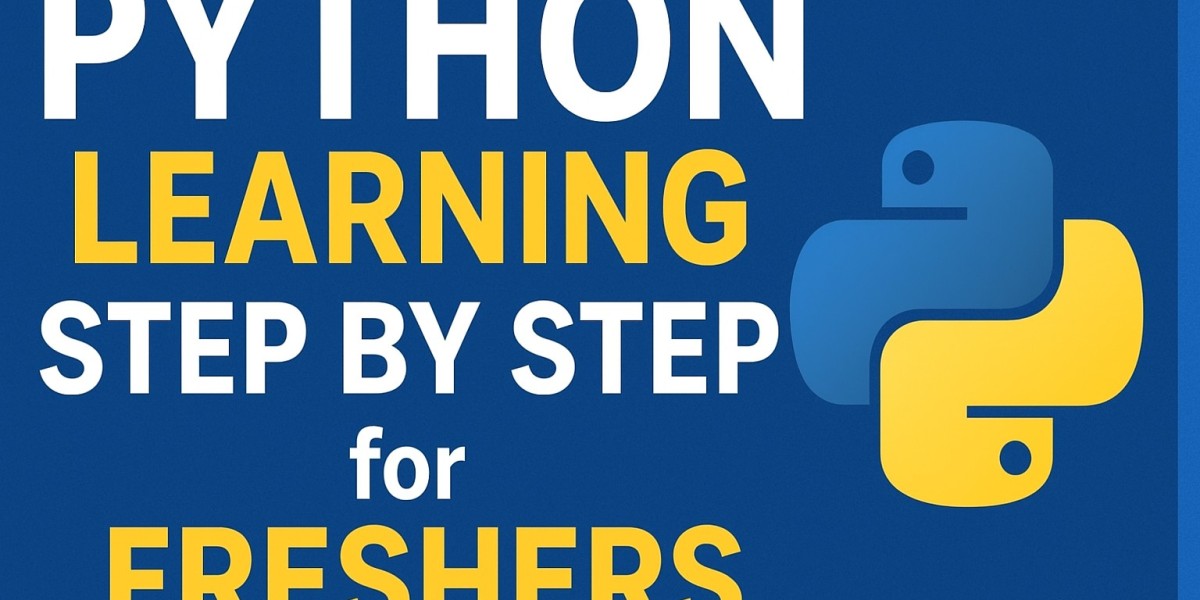Learning Python can be one of the most rewarding journeys for beginners stepping into the world of programming. Python is known for its simplicity, readability, and versatility, making it the first choice for freshers who want to start a career in software development, data science, artificial intelligence, or automation. If you are new to programming and looking for a structured roadmap, this step-by-step guide will help you build a strong foundation in Python without feeling overwhelmed.
For those who want expert guidance and hands-on practice, enrolling in a professional [Python Training in Chennai] can further enhance your learning experience and career opportunities.
Step 1: Understand Why Python Is Important
Before diving into Python, it is essential to understand why Python is considered one of the most in-demand programming languages in the industry. Python powers everything from simple scripts to advanced applications in web development, machine learning, artificial intelligence, cloud computing, and data analysis.
When freshers realize the practical applications of Python, it becomes easier to stay motivated and focused during the learning journey.
Step 2: Get Familiar with the Basics of Programming Concepts
Even though Python is beginner-friendly, having a basic understanding of programming concepts such as variables, data types, input/output, and flow control is crucial. These fundamentals are universal across programming languages, so mastering them with Python will give you confidence in problem-solving.
Freshers should focus more on understanding “why” something is done rather than rushing to memorize syntax.
Step 3: Learn the Building Blocks of Python
Once you are comfortable with programming concepts, start learning the key building blocks of Python. This includes:
Operators and expressions
Conditional statements (decision-making)
Loops (repetition and automation)
Functions (reusable blocks of logic)
Mastering these core elements ensures that you can write simple programs and gradually move toward solving real-world problems.
Step 4: Explore Python Data Structures
Python provides powerful in-built data structures such as lists, tuples, sets, and dictionaries. These structures help you organize, store, and manage data efficiently. For freshers, understanding data structures is one of the most critical milestones because almost every application, from small programs to advanced software, relies on them.
Step 5: Strengthen Problem-Solving Skills
Programming is not only about writing code but also about solving problems logically. Beginners should focus on solving simple problems such as number patterns, string manipulations, or list-based challenges. Developing problem-solving skills makes you industry-ready and prepares you for interviews and project work.
Freshers who attend structured Python Training in Chennai often get access to curated problem-solving sessions, coding challenges, and real-time projects, which accelerate learning.
Step 6: Understand Object-Oriented Concepts
Object-Oriented Programming (OOP) is one of the most powerful features of Python. Learning concepts like classes, objects, inheritance, and polymorphism allows freshers to think like professional developers. These skills are especially important for those aiming for software development roles.
Step 7: Explore Real-World Applications of Python
Once the basics are clear, freshers should explore how Python is used in various industries:
Web Development – Frameworks like Django and Flask.
Data Science & Analytics – Handling big data, visualization, and insights.
Artificial Intelligence & Machine Learning – Building predictive models.
Automation – Writing scripts to save time on repetitive tasks.
By exploring these areas, learners can identify their area of interest and shape their career path accordingly.
Step 8: Work on Mini Projects
Mini projects are a great way to put your knowledge into practice. Freshers can try simple projects like a calculator, to-do list manager, or basic data analyzer. These projects not only build confidence but also help in creating a portfolio for job applications.
Professional Python Training in Chennai typically includes hands-on projects guided by industry experts, helping students gain real-world experience.
Step 9: Join Python Communities and Forums
Learning Python becomes more enjoyable when you are part of a community. Platforms like Reddit, Stack Overflow, and Python forums allow freshers to ask questions, share knowledge, and collaborate on projects. Joining such groups also keeps you updated with the latest Python trends.
Step 10: Plan for Advanced Learning
Python is a vast language with endless possibilities. After mastering the basics, freshers can choose specialized paths like:
Data Science and Machine Learning
Cloud Automation and DevOps
Web and Mobile Application Development
Cybersecurity with Python
Continuous learning ensures career growth and long-term success.
Why Choose Python Training in Chennai?
While self-learning is possible, structured guidance often makes the journey smoother. By enrolling in Python Training in Chennai, freshers can benefit from:
Expert trainers with real-world experience
Practical sessions and industry-based projects
Interview preparation and placement support
Peer-to-peer learning with like-minded aspirants
This combination of theory and practice helps freshers transition smoothly from learning to working on professional projects.
Final Thoughts
Python learning for freshers is not just about picking up a new skill but about opening doors to multiple career paths. By following a step-by-step approach—starting from the basics and gradually moving to advanced applications—any beginner can become a proficient Python programmer.







